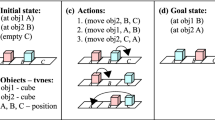Abstract
The paper examines the creation and evaluation of so-called situational informatics tasks based on assembling a program from blocks. Blockly technology has enabled us to develop an environment where templates, called “worlds“, can be created. In these worlds, pupils program a certain sprite to solve a problem emerging in a described situation. We created two such templates – the world of Karel the robot and the world of Film animation, differing both in behavior of sprites and set of commands. Each template was supplied with its own set of tasks, differing in topic, subject matter and graphics. As they go through each task, pupils repeatedly run the assembled program, being provided by the system with feedback. That comprises a visual check of how the programmed sprite behaves as well as system-generated notifications reporting whether all the requirements for completing a task have been met. The tasks that were compiled for this purpose were included in the Bebras Challenge. In our paper, we describe each of the templates and look at their didactic background as well as examining findings from the practical use of these tasks in the Challenge and their inclusion in the informatics curriculum. Results show that tasks created for the world of Karel the robot used in the Bebras Challenge are no more difficult than other algorithmic tasks. Moreover, informatics teachers are impressed with these tasks and they find it of upmost importance that the curriculum includes such tasks in order to advance pupils’ informatics skills.
Access this chapter
Tax calculation will be finalised at checkout
Purchases are for personal use only
Similar content being viewed by others
References
Gander, W.: informatics and general education. In: Gülbahar, Y., Karataş, E. (eds.) ISSEP 2014. LNCS, vol. 8730, pp. 1–7. Springer, Cham (2014). https://doi.org/10.1007/978-3-319-09958-3_1
The royal society: shut down or restart? The Way Forward for Computing in UK Schools. The Royal Society, London (2012). https://royalsociety.org/~/media/royal_society_content/education/policy/computing-in-schools/2012-01-12-computing-in-schools.pdf
K-12 Computer Science Framework Steering Committee: K-12 Computer Science Framework. ACM, New York, NY (2016). https://dl.acm.org/doi/book/10.1145/3079760
CSTA: K-12 Computer Science Standards (2011)
Blaho, A.: Informatika v štátnom vzdelávacom programe (Informatics in a state educational programme). In: Kalaš, I. (ed.) DidInfo 2012, pp. 7–14. Matej Bel University, Banská Bystrica (2012). http://www.didinfo.net/images/DidInfo/files/didinfo_2012.pdf
Sysło, M.M., Kwiatkowska, A.B.: Introducing a new computer science curriculum for all school levels in Poland. In: Brodnik, A., Vahrenhold, J. (eds.) ISSEP 2015. LNCS, vol. 9378, pp. 141–154. Springer, Cham (2015). https://doi.org/10.1007/978-3-319-25396-1_13
Wing, J.M.: Computational thinking. Commun. ACM 49(3), 33–35 (2006). https://doi.org/10.1145/1118178.1118215
Ministry of education, youth and sports of the Czech Republic: Strategie digitálního vzdělávání (Strategy of digital education). Ministry of education, youth and sports of the Czech Republic, Praha (2014). https://www.msmt.cz/uploads/DigiStrategie.pdf
Ministry of education, youth and sports of the Czech Republic: Rámcový vzdělávací program pro základní vzdělávání (Frame educational programme for basic education – basic version). Ministry of Education, Youth and Sports of the Czech Republic, Praha (2021). https://www.edu.cz/wp-content/uploads/2021/07/RVP-ZV-2021.pdf
Wing, J.M.: Computational thinking: what and why? Carnegie Mellon University, Pittsburgh (2010). https://www.cs.cmu.edu/~CompThink/resources/TheLinkWing.pdf
Wittmann, E.H.: Developing mathematics education in a systemic process. Educ. Stud. Math. 48(1), 1–20 (2001). https://www.jstor.org/stable/3483113
Xia, B.S.: A pedagogical review of programming education research: what have we learned. Int. J. Online Pedagog. Course Des. 7(1), 33–42 (2017). https://doi.org/10.4018/IJOPCD.2017010103
Ackermann, E.: Constructivism(s): shared roots, crossed paths, multiple legacies. In: Clayson, J.E., Kalaš I. (eds.) Constructionism 2010: Constructionist Approaches to Creative Learning, Thinking and Education: Lessons for the 21st Century: Proceedings for Constructionism 2010. Comenius University, Bratislava (2010)
Ackermann, E.: Piaget’s constructivism, Papert’s constructionism: what’s the difference? (2001). http://learning.media.mit.edu/content/publications/EA.Piaget%20_%20Papert.pdf
Jonassen, D.H.: Objectivism versus constructivism: do we need a new philosophical paradigm? Educ. Tech. Res. Dev. 39, 5–14 (1991). https://doi.org/10.1007/BF02296434
Kalaš, I.: UCL Scratchmaths curriculum. University College London, London (2017). http://www.ucl.ac.uk/ioe/research/projects/scratchmaths/curriculum-materials
The LEAD Project: Easy LEAD: Super Scratch programming adventure! No Starch Press, San Francisco (2012)
Chao, P.-Y.: Exploring students’ computational practice, design and performance of problem-solving through a visual programming environment. Comput. Educ. 95, 202–215 (2016). https://doi.org/10.1016/j.compedu.2016.01.010
Dagienė, V.: The bebras contest on informatics and computer literacy – students drive to science education. In: Joint Open and Working IFIP Conference, ICT and Learning for the Net Generation, pp. 214–223. Kuala Lumpur (2008). https://www.bebras.org/sites/default/files/documents/publications/DagieneV-2008.pdf
Bebras Challenge. https://www.bebras.org/
Bobřík informatiky (Beaver of Informatics). https://www.ibobr.cz/english-uk
Berki, J., Drábková, J.: Základy informatiky pro 1. stupeň ZŠ (Basic of informatics for primary school). Textbook. Technical University of Liberec, Liberec (2020). https://imysleni.cz/ucebnice/zaklady-informatiky-pro-1-stupen-zs
Trna, J.: Konstrukční výzkum (design-based research) v přírodovědných didaktikách. Scientia in educatione. 2(1), 3–14 (2011). https://ojs.cuni.cz/scied/article/view/11/12
Hour of code. https://hourofcode.com/
Pattis, R.E.: Karel the Robot: Gentle Introduction to the Art of Programming with Pascal. Wiley, Hoboken (1981)
Vaníček, J., Šimandl, V.: Participants’ perception of tasks in an informatics contest. In: Kori, K., Laanpere, M. (eds.) ISSEP 2020. LNCS, vol. 12518, pp. 55–65. Springer, Cham (2020). https://doi.org/10.1007/978-3-030-63212-0_5
Acknowledgement
The research was supported by the project TAČR TL03000222 “Development of computational thinking by situational algorithmic problems”.
Author information
Authors and Affiliations
Corresponding author
Editor information
Editors and Affiliations
Rights and permissions
Copyright information
© 2022 The Author(s), under exclusive license to Springer Nature Switzerland AG
About this paper
Cite this paper
Vaníček, J., Šimandl, V., Dobiáš, V. (2022). Bebras Tasks Based on Assembling Programming Code. In: Bollin, A., Futschek, G. (eds) Informatics in Schools. A Step Beyond Digital Education. ISSEP 2022. Lecture Notes in Computer Science, vol 13488. Springer, Cham. https://doi.org/10.1007/978-3-031-15851-3_10
Download citation
DOI: https://doi.org/10.1007/978-3-031-15851-3_10
Published:
Publisher Name: Springer, Cham
Print ISBN: 978-3-031-15850-6
Online ISBN: 978-3-031-15851-3
eBook Packages: Computer ScienceComputer Science (R0)




